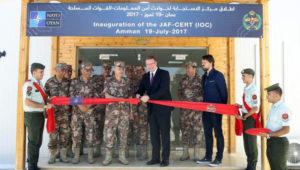
NATO and the Jordanian Armed Forces inaugurated the newly established Computer Emergency Response Team (CERT) in Amman on July 19, 2017. The CERT was set up as part of a NATO Science for Peace and Security (SPS) project to enhance Jordanian cyber defence capabilities.
Jordan’s geographical location and security environment – the conflict in Syria and Iraq on its borders, the refugee crisis in the region and the threat of terrorist organisations such as ISIL – make the country vulnerable to a number of threats. Particularly challenging are cyber attacks. To help counter this growing threat, NATO’s SPS Programme has been strengthening the cyber defence capabilities of the country, an active partner country in NATO’s Mediterranean Dialogue forum for cooperation. Launched in 2014, the SPS project – led by experts from Germany and Jordan and further supported by France and the United States – responds to a key national priority and forms part of the Defence and Related Security Capacity Building (DCB) package for Jordan. The DCB Initiative reinforces NATO’s commitment to partners and helps to project stability beyond NATO’s borders by providing support to nations requesting defence capacity assistance from NATO.
“This project signifies a milestone for cooperation in the area of cyber defence with a partner nation, and is the first of its kind to have been approved by NATO Allies,” says Christian Lifländer, Head of NATO’s Cyber Defence Section. “It supported Jordan in developing capabilities to defend its infrastructure, mitigate the impact of cyber attacks, and enhance the overall security situation in the county,” he explains.
The SPS project established a Computer Emergency Response Team (CERT) within the Jordanian Armed Forces, which represents a major milestone in Jordan’s national cyber defence programme and enhanced the country’s cyber defence posture. Through training and professional development, it contributed to the creation of a qualified and well-trained workforce. The success of the project was underscored by a decree of the Jordanian government, declaring the project to be a recognised national priority.
Building on the project’s accomplishments, a follow-on multi-year SPS project is currently under development. It will deliver additional capabilities that will complement, consolidate and strengthen those built during the first project.
NATO support for Jordan is not limited to the area of cyber defence. Under the umbrella of the SPS Programme, numerous practical activities to strengthen Jordan’s capabilities in the security sector have been launched. Two examples which also form part of the DCB package for Jordan, are a border security symposium for the Jordanian Armed Forces in March 2017 and a multi-year project in the domain of counter improvised explosive devices (C-IED) which was recently approved by NATO Allies. It will contribute to strengthening the C-IED capabilities of the Jordanian Armed Forces, including through the development of an official C-IED policy and doctrine.
Original published at: https://spacewatch.global/2017/07/nato-supports-jordans-national-cyber-defence-strategy/
 SpaceWatch.Global An independent perspective on space
SpaceWatch.Global An independent perspective on space

